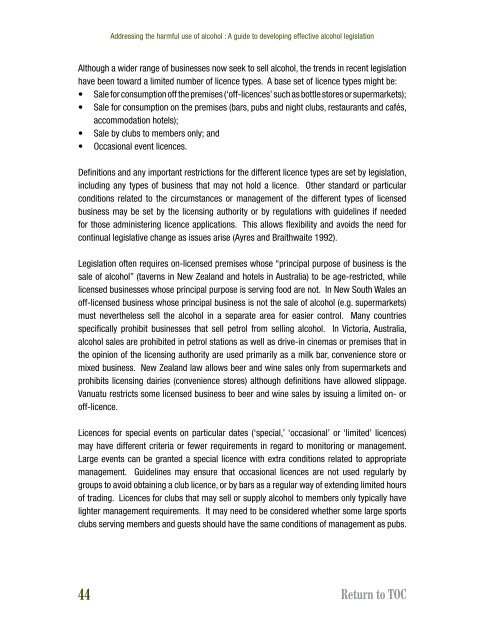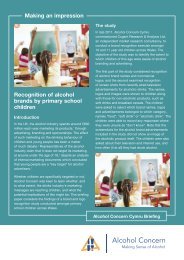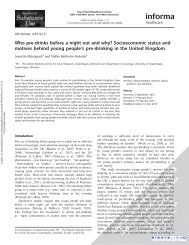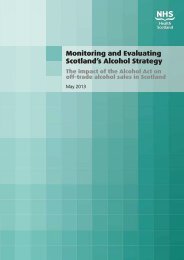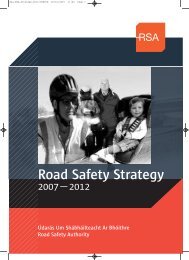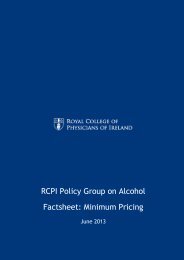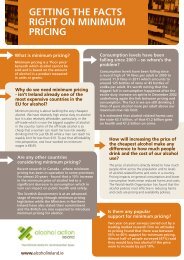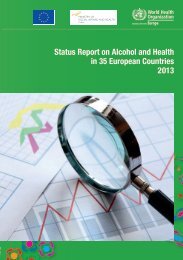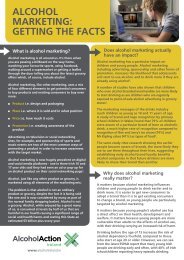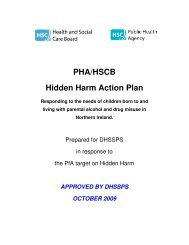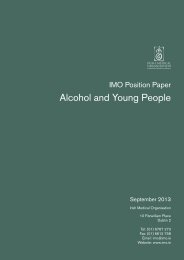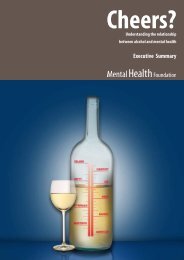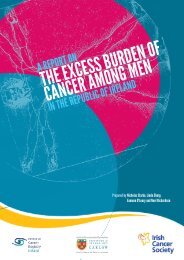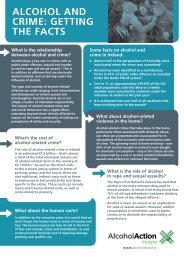Addressing the harmful use of alcohol - WHO Western Pacific Region
Addressing the harmful use of alcohol - WHO Western Pacific Region
Addressing the harmful use of alcohol - WHO Western Pacific Region
Create successful ePaper yourself
Turn your PDF publications into a flip-book with our unique Google optimized e-Paper software.
<strong>Addressing</strong> <strong>the</strong> <strong>harmful</strong> <strong>use</strong> <strong>of</strong> <strong>alcohol</strong> : A guide to developing effective <strong>alcohol</strong> legislation<br />
Although a wider range <strong>of</strong> businesses now seek to sell <strong>alcohol</strong>, <strong>the</strong> trends in recent legislation<br />
have been toward a limited number <strong>of</strong> licence types. A base set <strong>of</strong> licence types might be:<br />
• Sale for consumption <strong>of</strong>f <strong>the</strong> premises (‘<strong>of</strong>f-licences’ such as bottle stores or supermarkets);<br />
• Sale for consumption on <strong>the</strong> premises (bars, pubs and night clubs, restaurants and cafés,<br />
accommodation hotels);<br />
• Sale by clubs to members only; and<br />
• Occasional event licences.<br />
Definitions and any important restrictions for <strong>the</strong> different licence types are set by legislation,<br />
including any types <strong>of</strong> business that may not hold a licence. O<strong>the</strong>r standard or particular<br />
conditions related to <strong>the</strong> circumstances or management <strong>of</strong> <strong>the</strong> different types <strong>of</strong> licensed<br />
business may be set by <strong>the</strong> licensing authority or by regulations with guidelines if needed<br />
for those administering licence applications. This allows flexibility and avoids <strong>the</strong> need for<br />
continual legislative change as issues arise (Ayres and Braithwaite 1992).<br />
Legislation <strong>of</strong>ten requires on-licensed premises whose “principal purpose <strong>of</strong> business is <strong>the</strong><br />
sale <strong>of</strong> <strong>alcohol</strong>” (taverns in New Zealand and hotels in Australia) to be age-restricted, while<br />
licensed businesses whose principal purpose is serving food are not. In New South Wales an<br />
<strong>of</strong>f-licensed business whose principal business is not <strong>the</strong> sale <strong>of</strong> <strong>alcohol</strong> (e.g. supermarkets)<br />
must never<strong>the</strong>less sell <strong>the</strong> <strong>alcohol</strong> in a separate area for easier control. Many countries<br />
specifically prohibit businesses that sell petrol from selling <strong>alcohol</strong>. In Victoria, Australia,<br />
<strong>alcohol</strong> sales are prohibited in petrol stations as well as drive-in cinemas or premises that in<br />
<strong>the</strong> opinion <strong>of</strong> <strong>the</strong> licensing authority are <strong>use</strong>d primarily as a milk bar, convenience store or<br />
mixed business. New Zealand law allows beer and wine sales only from supermarkets and<br />
prohibits licensing dairies (convenience stores) although definitions have allowed slippage.<br />
Vanuatu restricts some licensed business to beer and wine sales by issuing a limited on- or<br />
<strong>of</strong>f-licence.<br />
Licences for special events on particular dates (‘special,’ ‘occasional’ or ‘limited’ licences)<br />
may have different criteria or fewer requirements in regard to monitoring or management.<br />
Large events can be granted a special licence with extra conditions related to appropriate<br />
management. Guidelines may ensure that occasional licences are not <strong>use</strong>d regularly by<br />
groups to avoid obtaining a club licence, or by bars as a regular way <strong>of</strong> extending limited hours<br />
<strong>of</strong> trading. Licences for clubs that may sell or supply <strong>alcohol</strong> to members only typically have<br />
lighter management requirements. It may need to be considered whe<strong>the</strong>r some large sports<br />
clubs serving members and guests should have <strong>the</strong> same conditions <strong>of</strong> management as pubs.<br />
44 Return to TOC


